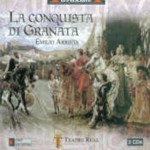The Navarra-born Emilio Arrieta, well-known as a composer of zarzuelas (Marina, from 1887, is his best-known work), was born in 1823 and studied at the conservatory in Milan. In 1845 his first opera, Ildegonda, with a libretto by Temistocle Solera (who had recently supplied the text for Verdi’s Nabucco), was performed twice at the conservatory, and upon return to Spain in 1847, after a chance meeting with Queen Isabel II, he was appointed by her as “Maestro di canto…y Compositor” with a generous stipend and artistic freedom. A theater was built for his work in the Royal Palace and his Ildegonda was staged there (with costumes made in Paris!); it found much favor with Queen and public.
She commissioned another work from him, on an historic subject, and the result, in 1850, was La conquista di Granata, his second and last “Italian” opera, again with a libretto by Temistocle Solera. The plot involves a Christian, Gonzalo, who loves the Moorish Princess Zulema, whose brothers are Boabdil and Almanzor, the famous last Moorish King and his warrior brother. The Queen wants Gonzalo to fight Almanzor, but the former does not wish to kill his lover’s brother, so his friend, Lara, takes his place and kills the Moorish warrior. Zulema’s father, Muley-Hassem, whose wife, Leonor, is a Christian, forgives Gonzalo and Lara. Eventually, Zulema and her father convert, the Christians win, and there is a hymn of victory. Just to place it in context, the work is contemporary with Lohengrin and Stiffelio.
This opera is a delight–it would not be stretching the point to say that you might confuse it with a work by either Donizetti or early Verdi (more the latter), and it makes you wonder what Arrieta might have turned out had he stuck to Italian opera. (He went on to compose 68 zarzuelas.)
There are rousing choruses, beautiful, tuneful cavatinas for tenor, mezzo, and soprano, inspiring and inspired duets and ensembles, and fine showpieces. Exotic but understated flute solos grace the introduction to the Act 2 opening aria for Zulema, Isabella’s third-act aria (in which she thinks about a conversation she had with Christopher Columbus!), and an Intermezzo in the third act. Martial brass excites, and the orchestration is very sophisticated throughout. The libretto shows Solera at his best; nothing lags, and the plot is as compact as the music. The opera’s two-hours and 10 minutes go by much as, say, Ernani’s, do.
This sonically excellent, clear recording comes from two concert performances in July 2006 at Madrid’s Teatro Real and it is, for the most part, excellent. The familiar names are José Bros as Gonzalo, previously known as a Bellini/Donizetti tenor, but whose voice has grown handsomely and who sings with passion, rhythmic verve and accuracy, and vibrant, bright tone, particularly in his third-act duet with Isabella. Alastair Miles is Muley-Hassem, and he brings his usual resonance, intelligence, and warm tone to the role.
The women are a trickier to love: Both are fine, accomplished singers, very involved with their roles, astute to dynamics and text. Mariola Cantarero’s Zulema is better conceived than sung–she has all the right instincts, but her tone, with its prominent vibrato, can grate. I got used to it and I recommend that you do as well–she’s an “A” artist with a “B” voice; what can you do? Mezzo Ana Ibarra as Isabella also does not own a voice of ravishing beauty, but she’s enormously impressive nonetheless. The smaller roles are well taken and Jesús López Cobos leads the Coro y Orquesta Sinfónica de Madrid in an exciting, well-paced performance. This is the opera’s first performance in 150 years, but I wouldn’t mind seeing it staged; I’ve returned to these CDs a couple of times already. Highly recommended for those who love Donizetti, and particularly early Verdi.
































